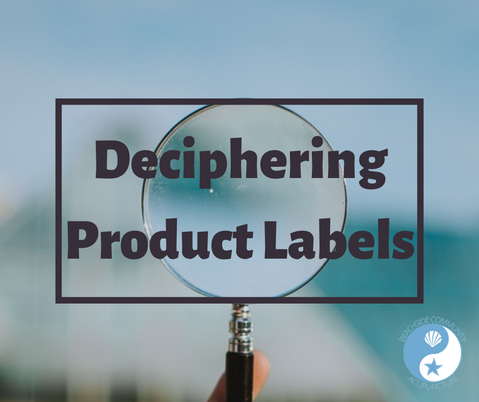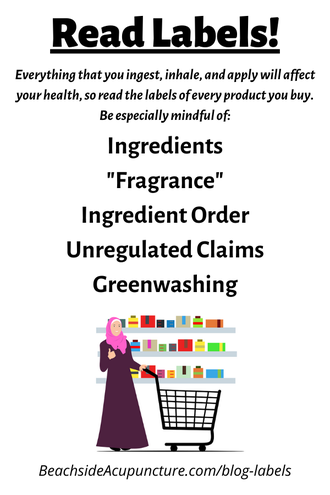
Everything that you ingest, inhale, and apply topically will have an effect on your health, so it's worthwhile to spend a few minutes looking at the labels of the products you buy. Read the labels of food, beverages, supplements, cleaners, makeup, lotions, and everything else that has one, being mindful of the following:
Ingredients
Ideally your products would contain only ingredients that you know and can pronounce. Edible and drinkable items would have words like "olive oil" and "water," personal care potions would contain "shea butter" and "aloe," and supplements would be made of "carrots" and "beef liver". If there are words that you don't recognize, look them up! Natural ingredients can sometimes sound unusual but be completely harmless and even beneficial. Some products may contain a lot of chemical names that are naturally derived, and a clean company will almost indicate that in some way. The Environmental Working Group has a vast amount of resources to educate consumers about the chemicals in various products and can be your best friend when deciding which products to choose.
"Fragrance"
We've said it before and we'll continue to say it forever: The word "fragrance" is a huge red flag. That simple word masks hundreds of chemicals that can be used to create a brand's signature smell, and companies are not required to list any of the chemicals because the scent is considered proprietary. Many products that claim to be "natural" - more on that below - still have "fragrance" on their labels, which means they probably are not natural at all.
A truly clean company may still have products with scents, but the ingredients used to make them will be listed out like any other ingredient. They're usually herbs or essential oils, and they may sound like chemicals at first glance if their Latin names are used. The colloquial English name will often be in parenthesis afterward, but if it isn't, you can always run a quick online search to find out what it is.
Ingredient Order
Ingredients are always listed in order of concentration, going from the highest to the lowest, which can help you determine the relative healthiness of a product. If sugar is the eighth ingredient listed in a beverage, for instance, that means there probably isn't that much in it. If sugar is the second ingredient, you may want to choose something else! If the product has preservatives like ascorbic acid (synthetic vitamin C), "flavors," artificial ingredients, or other not-exactly-from-nature components, they should be at the bottom of the list.
Unregulated Claims
Advertisers use all sorts of ploys to make products look appealing to health-conscious consumers, and unfortunately some of them can sound very convincing. For instance, the word "natural" means almost nothing, as parodied by this video. In contrast, there are very strict guidelines regarding the term "organic". Even small changes in wording can make a big difference - read this comparison of "no antibiotics" / "no medically important antibiotics" / "no critically important antibiotics" / "no growth-promoting antibiotics" as an example - and allowable claims can fluctuate with government policy changes. When in doubt, run an online search to double check a claim's meaning.
Greenwashing
Advertising gimmicks now also extend to tricking eco-conscious consumers as the desire for environmentally friendly products increases. While some companies honestly wish to better the planet by changing their ingredients, manufacturing processes, and packaging, others simply want the income without putting in the work, what's popularly called "greenwashing". Just like health claims, green claims can sometimes be made simply as part of a marketing strategy. "Sustainable," "clean," and other terms are not regulated, but you can look for the "stamp of approval" of creditable institutions like the Green Business Bureau or Fair Trade USA.

This short list barely scratches the surface of what to check on a label, but it's a good place to start! By reading ingredients and minding their order, you'll usually end up with foods and beverages with healthier nutrition stats, such as lower sugars and sodium, personal care products with fewer xenoestrogens and toxins, and supplements comprised from whole foods. You'll also have a good jumping off point for investigating the other nuances of labeling, such as the differences between whole, refined, and enriched grains or cage-free, free-range, and pasture-raised chickens. Have the goal of always knowing exactly what you're putting into your body and optimizing the health benefits of the products you consume. The small amount of time that you spend on research will give you more sustained wellness in the long run.

Kathleen Ketola is a Licensed Acupuncturist and the owner of Beachside Community Acupuncture. She loves providing affordable acupuncture to the residents of Addison, Dallas, and Farmers Branch, Texas, and educating the general public on how acupuncture and Traditional Chinese Medicine can treat everything from pain to infertility to stress and beyond. Click "Book Now" at the top of this page to book an appointment or feel free to contact her at (214) 417-2260.









